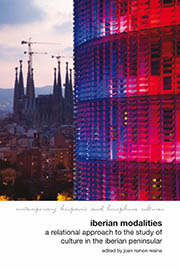Book contents
- Frontmatter
- Contents
- Preface
- List of Contributors
- Introduction: Iberian Modalities: The Logic of an Intercultural Field
- Part I Institutionalizing Iberian Studies: A Change of Paradigm
- 1 Dine with the Opposition? ¡No, gracias! Hispanism versus Iberian Studies in Great Britain and Ireland
- 2 “If We Build It, Will They Come?” Iberian Studies as a Field of Dreams
- 3 Implementing Iberian Studies: Some Paradigmatic and Curricular Challenges
- 4 Interliterariness and the Literary Field: Catalan Literature and Literatures in Catalonia
- Part II Theorizing Iberia
- Part III Iberian Dialogs
- Part IV From Sea to Iberian Sea
- Works Cited
- Index
2 - “If We Build It, Will They Come?” Iberian Studies as a Field of Dreams
from Part I - Institutionalizing Iberian Studies: A Change of Paradigm
- Frontmatter
- Contents
- Preface
- List of Contributors
- Introduction: Iberian Modalities: The Logic of an Intercultural Field
- Part I Institutionalizing Iberian Studies: A Change of Paradigm
- 1 Dine with the Opposition? ¡No, gracias! Hispanism versus Iberian Studies in Great Britain and Ireland
- 2 “If We Build It, Will They Come?” Iberian Studies as a Field of Dreams
- 3 Implementing Iberian Studies: Some Paradigmatic and Curricular Challenges
- 4 Interliterariness and the Literary Field: Catalan Literature and Literatures in Catalonia
- Part II Theorizing Iberia
- Part III Iberian Dialogs
- Part IV From Sea to Iberian Sea
- Works Cited
- Index
Summary
Normal Fantasies
It is perhaps rather unconventional to start an analysis of what the academic discipline of Iberian studies is or could be by referring to an American sports film, Field of Dreams (1989). Nevertheless, I hope to show that some interesting connections can be made by relating the fantasy that the film's plot is built upon to the underlying assumptions that have sustained the field of Spanish studies, and the new epistemological spaces that the disciplinary paradigm of Iberian studies can open up. Allow me, then, to talk a bit about Field of Dreams. While popular in its time, it is safe to say that its most ardent fans are not academics, many of whom surely are not interested in a film about baseball and the rural mid-west. In fact, I must confess that I myself have no interest whatsoever in, and even less knowledge of, baseball. I am interested in and know something about the rural mid-west because I live near it, at least technically speaking. I say “technically” because my own professional location in a major research university town where most professors, in fact, come from the east or west coasts, if not from other countries, locates me in what many of my colleagues literally call (with relief and in a positive sense) “an island” within the mainland. On the other hand, many of the actual farmers that live not far from our university town view our metaphorical distance from their own location with disdain, unfailingly pointing out our collective academic snobbery, the lack of usefulness of our work (particularly in the humanities) and our unawareness of what “real” America is or should be. I will come back to two of these concepts: academic island and “real America”—or “real” anywhere, for that matter. For now, let me address what I perceive to be the explicit connections between this Hollywood film and the emerging discipline to which the present volume is dedicated.
- Type
- Chapter
- Information
- Iberian ModalitiesA Relational Approach to the Study of Culture in the Iberian Peninsula, pp. 37 - 53Publisher: Liverpool University PressPrint publication year: 2013

